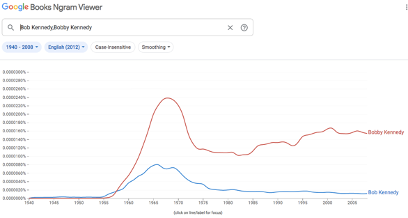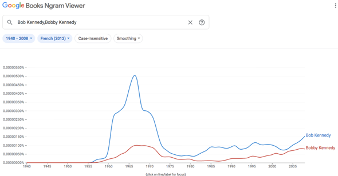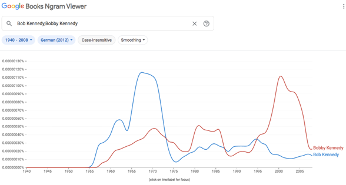RFK's first name
« previous post | next post »
Below is a guest post by Bob Ladd.
For years I’ve been puzzled – or at least struck – by the fact that my (Italian) wife always refers to “Bob Kennedy” rather than “Bobby Kennedy” whenever he comes up in a conversation (his assassination was one of the first international political events she was really aware of). Today it came up again because Beppe Severgnini (a prominent Italian journalist) wrote a piece in the Corriere della Sera about how RFK Jr. is a prominent anti-vax person. So I thought about it again, and it occurred to me that maybe “Bob” is simply how he’s referred to in Italian. Sure enough, in Severgnini’s piece he is referred to as “Bob”.
So I fired up Google’s n-gram site and ran the relevant comparison. It’s 100% clear that this is not an idiosyncrasy of my wife’s, but just what the guy is called in Italian.
| ENGLISH | ITALIAN |
 |
 |
So then I wondered if this was an English vs. Italian thing or a native vs. foreign thing. There’s enough data in Google to suggest it might be the latter, though recently at least some foreigners seem to have moved toward the native version, and in any case the gap in Italian looks bigger and better established than in other European languages:
| FRENCH | GERMAN | SPANISH |
 |
 |
 |
Any ideas why or how this difference (whichever it is) might have come about?
Above is a guest post by Bob Ladd.
Fernando said,
December 8, 2021 @ 9:17 am
At least in Brazil, where I grew up, most people would pronounce “Bob” as something very close to “Bobby”. So hearing “Bobby” they might well write “Bob”.
J.W. Brewer said,
December 8, 2021 @ 9:23 am
Somewhat to my surprise, I learn via the google books corpus that "Bob" was a respectable variant while RFK was still alive. Here's an example from a 1966 book by JFK sidekick Pierre Salinger: "Earlier that day I had gone to Bob Kennedy's room which was across from mine in the BIltmore Hotel." And here's something from Life magazine from 1958: "Michael, the newest Kennedy, is son of Bob Kennedy, the Senate rackets investigator. He is a nephew of Senator Jack Kennedy, a leading candidate for the Democratic presidential nomination." From the n-gram viewer it looks like the Bobby:Bob ratio was no more than 3:1 in the "American English" subcorpus through the late 1970's, but then things started diverge more dramatically such that Bobby had closer to a 9:1 advantage (maybe more when you net out "false positives" for other individuals known as Bob Kennedy) by the late 1990's.
Cervantes said,
December 8, 2021 @ 9:32 am
In Italian the long e final sound (spelled i) forms the plural. It's the diminutive suffix in English, but doesn't work that way in Italian.
Philip Taylor said,
December 8, 2021 @ 9:54 am
Would this be the same member of the Kennedy clan that we in Britain tend to refer to as "Robert Kennedy" ?
J.W. Brewer said,
December 8, 2021 @ 10:00 am
Elsewhere in the Kennedy clan, per the google books n-gram viewer and its "American English" subcorpus, "Ted Kennedy" has consistently been more common than "Teddy Kennedy," but despite the fact that Ted>Teddy seems inconsistent with Bobby>Bob in terms of which form is the majority variant, there's the same temporal pattern I noted above, where the ratio becomes more lopsided and the minority variant's market share drops quite significantly after circa 1980. But I haven't explored that in other languages, and in both cases it seems like if a given language's usage pattern had been fixed in favor of one of the variants in use in the US early on, subsequent shifts in US usage (in terms of changes in the relative market share of the variants) would not necessarily flow through to that other language.
DJL said,
December 8, 2021 @ 10:09 am
@Cervantes Not sure the plural/diminutive distinction is applicable in that way in Italian, especially considering how common anglicisms are in Italy. Robbi for Italian Roberto (or, indeed, for Roberta!) rather than, say, Robertino/a, is very common in Italy (as in Robbi Baggio, for instance).
J.W. Brewer said,
December 8, 2021 @ 10:09 am
NB that the Italian wikipedia article about him begins "Robert Francis Kennedy, chiamato Bob (o, affettuosamente, Bobby) e noto come RFK …" By contrast, the article about the famous English soccer player begins "Sir Robert Charlton, detto Bobby …" and that about the famous American chess player begins "Robert James Fischer, detto Bobby."
Rodger C said,
December 8, 2021 @ 10:38 am
I have the impression that Edward Francis Kennedy deliberately encouraged "Ted" over "Teddy," in order to fight the perception that he was immature.
Yuval said,
December 8, 2021 @ 11:36 am
Adding a data point, I have never heard "Bob Kennedy" in Hebrew.
Johanna Bishop said,
December 8, 2021 @ 11:56 am
My Italian partner has no idea. He said "Bobby sounds like a dog," but I think that's because his friend used to have a dog named Bobi. For some reason David Foster Wallace is always Foster Wallace here, and W. H. Auden tends to be Wystan Hugh Auden. I would suspect that some prestigious journalist back in the day decided to call him Bob and others followed suit.
F said,
December 8, 2021 @ 12:05 pm
Johanna says: "For some reason David Foster Wallace is always Foster Wallace [in Italy]"
A lot of English language names get similar treatment in Russian, for example Thomas Mayne Reed is always Майн Рид /majn rid/.
MGD said,
December 8, 2021 @ 12:34 pm
Maybe because Italian "bobbi" means "daddies"(?)
J.W. Brewer said,
December 8, 2021 @ 12:43 pm
Rodger C.: that's plausible enough re Ted(dy), but raises the question of whether RFK himself favored (for whatever motive) Bobby over Bob, or whether he was indifferent and the preferences of others (whether close keepers-of-the-flame associates or more random tastemakers) ultimately led to Bobby being the more popular form. And I'm still intrigued to learn that the variants for both men were in closer competition in the '60's and '70's than they have subsequently become and don't have a particular causation story to offer for that.
J.W. Brewer said,
December 8, 2021 @ 1:15 pm
Should have included in my last comment that Italian wikipedia has the younger brother (in the article devoted to him) as "Ted Kennedy, all'anagrafe Edward Moore Kennedy." No hint of "Teddy" except in the title of an English-language news story that's footnoted as a source. Obviously we can't expect wikipedia to follow a consistent "house style" from article to article in matters like this, but I offer this FWIW.
Bloix said,
December 8, 2021 @ 3:36 pm
F – In the UK, people with what are called double-barreled names are pretty common. Ralph Vaughn Williams, David Lloyd George, Andrew Lloyd Webber, Sascha Baron Cohen. In the US similar names almost always take a hyphen, but rarely in the UK.
I suspect that people who learned British English were taught about double-barreled names and don't realize that American usage is different.
Bloix said,
December 8, 2021 @ 3:43 pm
J.W. Brewer –
In recent years the y, i, or ie suffix attached to a male or non-gendered name or nickname has become almost exclusively used for a female name or nickname. Jackie, Tommy, Joey, Bobbi, Charli, Jodi, Chrissie, etc. So possibly the feminization of the y/i/ie ending has driven such names out of usage for males except for very young boys.
Gregory Kusnick said,
December 8, 2021 @ 4:27 pm
Not that I've noticed. Just off the top of my head: Johnny Depp, Donnie Wahlberg, Bobby Cannavale, Charlie Sheen, Danny Bonaduce, Jimmy Smits, Billy Bob Thornton…
Jerry Packard said,
December 8, 2021 @ 4:39 pm
Italian has strong syllable-final vowel epenthesis, so it's not necessary to insert the [i] in a sense because it's 'already inserted' as a reduced vowel, which I believe was Fernando's point.
In English the final B in Bob (as Bob L. can readily attest) is often unreleased, or released but voiceless, whereas in Italian a syllable-final B would be rare and where it exists an epenthetic vowel would be hard to suppress by a native speaker (once again speaks to Fernando's observation).
My mom, born and raised near Florence, would usually call my cousin Roberto 'Bobby', as did his father, but his name was usually produced as a pair with his brother Riccardo's as 'Bobby and Dickie', so there was little motivation to truncate.
Marc Foster said,
December 8, 2021 @ 4:40 pm
Having read several biographies about Robert Kennedy (starting with the one by Arthur Schlesinger, Jr.), Bobby was used in familiar contexts (among family and with close friends) while he was alive. Bob or Robert was preferred in more formal/business/political contexts (again while he was alive). Among his political allies, Bobby was seen as less respectful when used by people who were not personally close to him. Bobby (and Jack for JFK) have become much more common in later years. I could only speculate as to why.
J.W. Brewer said,
December 8, 2021 @ 4:44 pm
@Bloix: I would say that the pattern already existed 50+ years ago that in *some* American demographic groups, a boy known as Jimmy would naturally become Jim as he got older while in others he would remain Jimmy. The turns-into-Jim pattern was perhaps unmarked/normative in the sense that that was the usual practice of Northern whites who were not too "ethnic," whose social practices thus were sort of definitionally unmarked and Normative-American, whereas the stays-Jimmy pattern was more common among Southern whites, blacks regardless of region (largely because Northern blacks were in certain cultural respects unassimilated immigrants from the South), and some "ethnic" groups — I might say e.g. Italian more than Irish but that may just be that I grew up in a time and place where the Irish were already pretty assimilated. Maybe there's been a further shift toward the turns-into-Jim pattern over the last 50 years that you've noticed and I haven't, but it seems an empirical question that would require good data for either of us to convince the other. But in either case the interesting question is how Bobby Kennedy fits into these patterns. I supposed its possible that his violent death at a comparatively young age makes the "boyish" alternative more desirable from a mythic standpoint, because the sense of him having been snatched from life too young outweighs any lack of gravitas that the "boyish" alternative might imply? That said, for anyone following the Jimmy-to-Jim progression as a cultural norm you would have expected the transition to have been fully completed at a considerably younger age than RFK was (42) when he was killed.
J.W. Brewer said,
December 8, 2021 @ 4:57 pm
Note also that the girls-nickname phenomenon bloix notes is, as to specific instances, highly subject to generational-cohort effects. So Bobbi/Bobbie as a nickname for a female named Roberta has fallen on hard times among younger American cohorts as Roberta has itself fallen out of common use: it was among the top 100 names for US-born girls every year but one from 1935 through 1953, but then started a downward slide, dropping out of the top 250 after 1970, the top 500 after 1982, and the top 1000 after 1991. I wouldn't be surprised if my daughters have never met a female Bobbi(e) their own age, although if they asked around they probably have one or more friends with a Great-Aunt Bobbi(e). So whether or not they would think it odd for a male their age not to transition from Bobby to Bob by his teens or twenties, that seems comparatively unlikely to be affected by interference from Bobbi(e) as a female name.
Bob Kennedy said,
December 8, 2021 @ 6:24 pm
I have noticed that if you search for "Bob Kennedy" in google your results will still strongly skew towards RFK content. Likewise (speaking from experience) if you tell people (of a certain age) that your name is Bob Kennedy, they will comment on the overlap. I think the account mentioned by several commenters upthread, that 'Bobby' for RFK was rarely used in his life but now more so in his memory, makes the most sense for this discrepancy.
Morten Jonsson said,
December 8, 2021 @ 6:31 pm
@F
I don’t doubt your observation about Russian treatment of English names, but Mayne Reid is the name he was known by in the English-speaking world too. It wasn’t uncommon for those three-named gentlemen of the time to go by the last two names; Holman Hunt is another example.
It’s interesting that you’d think of him, Is he better remembered by Russians than by English readers?
David Marjanović said,
December 9, 2021 @ 11:16 am
Spelling it with i correlates 100% with the female persuasion of the bearer, as far as I've noticed; a Terry might still be Mr. McAuliffe, but a Teri is definitely a woman. There even used to be an Ashli out there.
J.W. Brewer said,
December 9, 2021 @ 12:37 pm
@David M.: I would say a -i spelling correlates very strongly with femaleness, but nothing's ever 100%. There is at least one male on wikipedia's list of notable persons known as "Bobbi,", and consider the fictional and animated (but voiced by Sean Connery) title character in this film: https://en.wikipedia.org/wiki/Sir_Billi
Kristian said,
December 10, 2021 @ 1:59 am
David Foster Wallace isn't a double barreled name. Ralph Vaughan Williams' father was also called Vaughan Williams but DFW's father wasn't Foster Wallace. Wallace is his last name and Foster is what I would expect he would call his middle name (which was his mother's maiden name).
I remember reading he used all three names as a writer to distinguish himself from some other David Wallace. To refer to him as "Foster Wallace" is incorrect. I suppose the habit of giving surnames as given names is confusing to Italians.
J.W. Brewer said,
December 10, 2021 @ 11:36 am
So do we have a consensus conclusion to the original question asked by Bob (I take it not Bobby …) Ladd? My sense is that, details of Italian phonology etc. aside, it is probably just as simple as: (a) way back in the 1960's when he was first a sufficiently newsworthy figure to be referred to in Italian, some key early Italian journalists went with "Bob" when that was still a reasonably common way he was referred to in U.S. news stories (even if perhaps a minority variant), with that initial preference in Italian for Bob quite possibly being somewhat random/contingent; and (b) whatever subsequent factors led to Bobby becoming the more overwhelmingly dominant variant in English-language writing in the decades after his death did not have any spooky-action-at-a-distance effect on Italian usage, which remained as it had started.
Philip Taylor said,
December 10, 2021 @ 12:30 pm
JWB — when you write "becoming the more overwhelmingly dominant variant in English-language writing in the decades after his death", I assume that you are deliberately using the comparative rather than the superlative because you are comparing and contrasting only "Bobby" and "Bob". If this is indeed the case, then Google Ngrams confirms your statement, but if one considers all three variants, then "Robert Kennedy" is more than twice as common as "Bobby Kennedy", as I suggested in my earlier comment.
J.W. Brewer said,
December 10, 2021 @ 12:44 pm
Philip T.: Yes, you assumed correctly what I was trying to convey. Now, if the ratio of "Robert" to "Bob + Bobby" in other languages is materially different than it is in English, and/or has exhibited different evolution over time, that could be another interesting puzzle in search of an explanation, but it's not one I am currently trying to delve into.